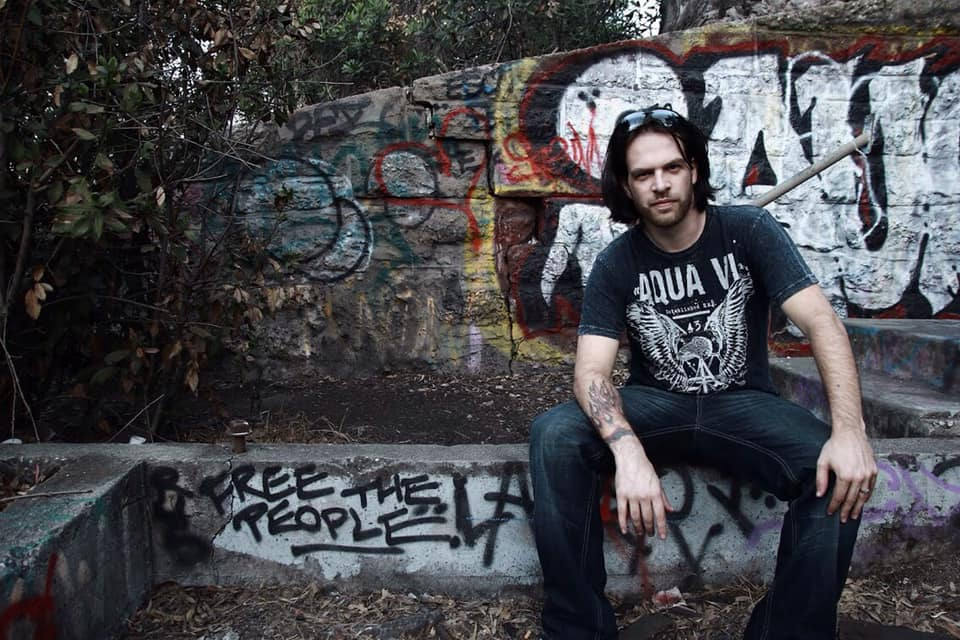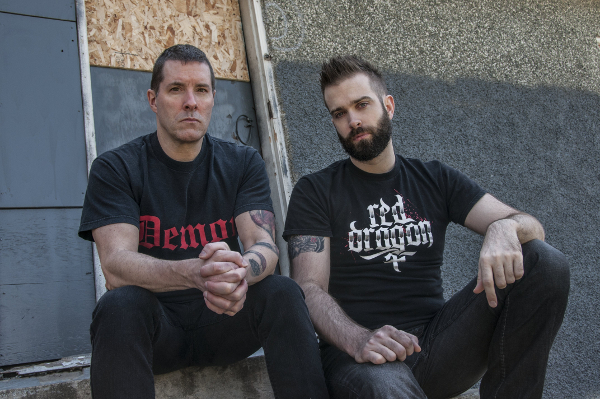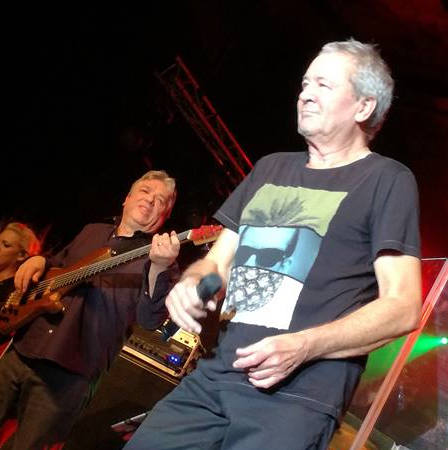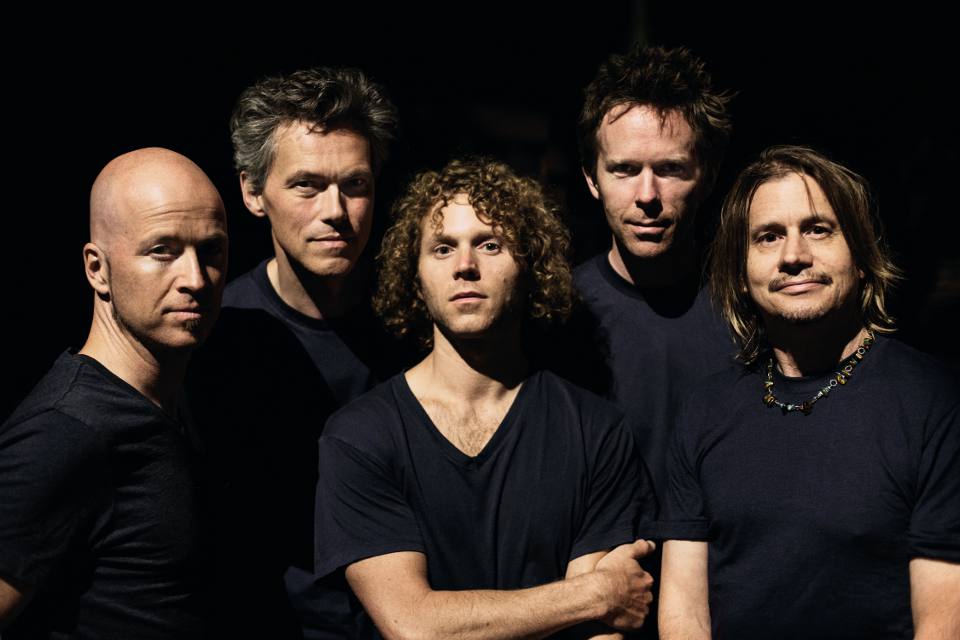
Hardrock Haven recently got a chance to sit and chat with Sean Martin, leader of SoCal-based band The Quarantined, to get his thoughts on music, life, and political activism. Here’s what he had to say.

– Let’s start from the beginning: how did The Quarantined come into being?
The band began in Hollywood in 2010 when I showed some friends of mine who I went to Musicians Institute with some songs I had written. They liked them and also needed to play out in L.A. as much as I did. I wrote an 8-part blog/Op-Ed about our origins, and it describes the business plan I wrote for the band that describes the whole process of building something from nothing, in a tongue-in-cheek kinda way, but also directly applying the lessons I learned from MI, called, “Music in the Digital Era”.
I had the idea for The Quarantined as a band name since I started playing guitar at 12. I only shared the name as an idea for a band with a few close friends, until I was ready to have the members almost 10 years later. Sounds crazy, that’s because it’s true.
The real way the band sustains is because I learned how to play every role I could in music production: performing, recording, producing, mixing and mastering.
– What are your influences? How has your style developed over time?
Everything I’ve ever heard is an influence. Everyone I’ve studied with, teacher and student, every near life experience ;) every love, heartbreak, every atrocity over the last 20 years, the struggle to stay alive in a backwards ass culture like we have, the glorification of idiocy as popularity, the glorification of who can get away with the most — these adversities are not individuals, but they are antagonists to us, and while I may despise the circumstances, I am inspired to act in response to these things with empathy, compassion, and brutal honesty. It’s been an important exercise to respect people separately from their ideas. An idea gets respect if it works, people get respect by virtue of being alive.
Existence itself inspires music in me — I’ve trained most of my life to be able to find inspiration in everything.
Sometimes I think of my music like a PsyOp that builds up the psyche of the average American, as the reality being that simply believing what we are told will not suffice in any path forward, while there is a way to be more than what we are told to be and it is not easy…this situation dictates that determination and mental endurance is key. Music can reveal the truth simply when society complexly lies. And the truth — that fucker hurts, and it saves lives. These are moral and ethical influences on writing.
My musical style developed by first being emotionally driven as a catharsis for PTSD gone untreated backed up by a full education on everything musical.
Once I saw the industry for what it is (a dead horse in the ocean), I knew I wanted to be more than somebody’s musical punching bag in a contest for likes and views on YouTube and Facebook, competing with farting pandas for the attention span of an apathetic random music fan looking for something to make fun of or get outraged by, or whatever is the flavor of the year on “American Idol.” I felt like I had a few shots, so I had to make ’em count, but the reality is: as long as I stick to my disciplines and never give up being an artist with a purpose, and fuck what other people want it to be, I’ll survive because an investment in myself is always the best investment over time. The music industry is not a meritocracy, no matter how much we want it to be.
That lesson nearly killed me.
My musical influences are mostly grunge music, underground punk and hip-hop of the ‘80s and ‘90s, metal from all eras, and the defectors — John Lennon, Harry Nilsson, Zack de la Rocha, Chris Cornell, Patti Smith, Kurt Cobain, 2Pac, KRS-One. They do it to send a message through time — when you hear the heart of their message, you know it’s for changing society; they are discussing ideas — not people — even though people in a song may be the personification of an idea. I try to challenge the perception of our country with storytelling from real life. I dare to change people’s minds, as I am a living exception to the rules that people have about musicians, veterans, PTSD, secular humanists — I’m an infantryman and a poet, an atheist in a foxhole, I learned how to be objective over my feelings so I am not a slave to them, I’ve faced my own death and smiled back into the abyss, fought for another society to resist Islamofascism, and now write songs about how us and them have remarkably similar processes of slipping into fascism, politically and socially, and I still care enough to try and change the world through non-violence, despite knowing full well how be violent to change the world.
– Tell us about the process of writing your new single, “Shadow.”
The process began when I was having a mental breakdown, and my roommate at the time (who became my co-producer and best friend) tried to get me to just write the feelings out and get out of my own way to let my truth out. So, I did, and thus began the process of learning how to connect music to real feelings that aren’t butterflies and rainbows into fuel to play music, whereas before I wanted to give up on life entirely. I make it sound succinct and easy, but this is a scary process that musicians do lose themselves in. The music took a few times in the studio to get the riffs and feelings lined up. Then I took a good five years of break from this song, didn’t play it or work on it at all, even though it was the actual first song I wrote specifically for The Quarantined, but “Where Did You Go?” And “Ballad of a Dead Man” was released first.
This last year, I decided to try again at the song. I had felt completely different in my musical capabilities now compared to then and went through a different journey of technical growth in revisiting it and recreating this new version. The sentiment of the song was still relevant — it is a song with personal meaning of recognizing the darkness inside, but one could take the context as a commentary on how misdeeds (a shadow) can haunt you until karma exacts its revenge, and that waiting makes you feel like you’re “in race with my past every day.” In that context, it’s a warning — the shadow on your back tells your fate. Or, in a political subtext, Roger Stone has a tattoo of Nixon on his back. The shadow of Nixon’s type of fraudulence hangs over this current administration, and it isn’t a coincidence. In fact, it might tell their fate, that Trump will go down as worse than Nixon.
All those contexts and subtexts are valid.
– How would you describe “Shadow” in sonic terms? And give us some insight into the style and message of the album “Aversion to Normalcy” as a whole.
Shadow is a heavy, upbeat grunge song with badass guitar solos. The album is me lamenting the downfall of society via stupidity and reinforced narcissistic amoralism passed off as benevolence, and my aversion to that “normalcy” that America has become. The album is a tip of the hat to an old cliché — if idiots become the norm, have a healthy heaping aversion to normalcy. Seek knowledge, drop biases, check yourself before you wreck yourself, and be smarter than the smartest dumbass. This saying also applies in political spectrums — if tribalism/fascism/authoritarianism becomes the norm, be the aversion to normalcy.
– What is the meaning behind your band’s name? How did you come to be known as The Quarantined?
The Quarantined was an idea for a band, and as a band name, came into being when I was 15, working three jobs in high school — it came from the feeling I had of being ostracized from people, or loving and not being loved in return, and also questioning if society was the one that was strange and not me. The word by itself describes a dichotomy of self to society, true self to facade, a yin, and yang, but that, too, could be a misdirection of us versus them. Without situational knowledge from seeing the world as it is, or if you don’t know who you are, or you live for someone else’s happiness and disregard your own well-being, we might never know who are the free and who are the Quarantined, and yet we still are one or the other even, if we don’t know. It’s a subtle push for my favorite saying: knowledge is power.
Another concept for the name’s meaning and purpose was to personify the fear of being alone in this world against the fear of the world never changing for the better — my solution to these two problems of the empathetic is self-empowerment through objectivity, embodying the Seven Army Values, and understanding before judgment. In L.A., I kept hearing people say “wow, it’s amazing that I feel alone in a city of 10 million people.” An oxymoron that reveals the division we have become complacent to. As I know from being a deployed infantryman, complacency kills.
– It looks like you’re an avid activist. Please tell us about some of the causes that you stand for. How do you express these convictions in your music?
I support many ideas, all with the objective to improve our society: equality under the law, judging people by the content of their character and not superficialities, mental health program reform, supporting veterans after war is something that is very close to my heart, as I struggled for years with PTSD, readjusting to society, homelessness. I support more funding for programs to help people become more self-sufficient than our education system allows people to be. Of course, with that is also marijuana legalization and to bring awareness of how our endocannabinoid system assists in repairing the other systems that get damaged by PTSD.
Education reform, separation of church and state, nobody is above the law. Most importantly, I am anti-corruption and thoroughly support the Represent. US mission to end corruption in America for good. Oh, and impeach, indict, and jail Trump, all the way.
All of these ideas are present in my lyrics. The music is the result of the expression of these convictions in the face of the adversity, even if that adversity is not a person but a thing. For example, Alcohol abuse- it’s a band-aid on a wound. But it’s also a battle for your own perception of self-worth; at the same time, the bottle may heal you now and kill you later. This is what part of “Drink to Forget” is about.
– Are there any particular caused-based programs that you participate in that you would like to tell us about?
I am a huge supporter and advocate for Free2Luv, a non-profit that has a mission I share: to end bullying, to accept our diversity, to inspire us to reach for more than what we’ve been told, to save lives through the arts.
I also support the Volunteers of America as it happens: because of their PTSD clinic for veterans, I was able to continue on when I was at my lowest
.
– You’re also a gamer. What were your favorite video games growing up? What are you playing now?
My favorite game series growing up: the “Baldur’s Gate” series (PC), the “Diablo” series, “Command and Conquer,” the “Suikoden “series (1-5, number two is maybe my favorite game of all time), and the “Fallout” games. “KOTR” is almost in there. The games I’m playing now are “Warframe,” “Tom Clancy’s Wildlands,” “Borderlands 2” to warm up for the coming third installment of that, and I love the starfighter battles in “Battlefront 2.” I merc fools, and it’s so much fun for a break from working…and I’ve been eyeing “RDR 2” for probably too long.
– Does your love for video games inform your songwriting? And do you have a favorite video game score?
There is a commonality between the space you can get into with a good game, and the Zen-type feeling you get from grooving with a band. You stop feeling yourself and become part of the environment, and your brainwaves change back and forth between beta and gamma waves; meaning you’ll have high functioning brain activity in a relative sedentary state that is rational and imaginative at the same time. That process informs my songwriting, and it helps me decide what to do and not do with a song.
– What gear does the band use?
I use Schecter and Fender Guitars with either Bogner or Mesa Boogie Amplifiers. Jeremy builds his own guitars along with his own pedals. Alex uses a Music Man Sterling bass. I use Universal Audio plugins for mixing and an Apollo interface for recording and mixing. UAD plug-ins are amazing.
– Where did you record your album, and who handled producing duties? What gear was used in the recording process?
This new record, “Aversion to Normalcy,” is being recorded in my apartment. I’m doing all of the producing, and the guys are recording their parts where they are and sending them to me. It’s very different from the last record, “Antiquate Hate,” which had everybody all together at once in a very nice recording studio (Ultimate Studios, Inc.).
All the gear I listed above is being used on this record. This time around, we’re relying heavily on Universal Audio and good, old-fashioned mixing techniques and elbow grease to get it done.
– Do you have any upcoming live dates?
Not right now, but we have some very promising additions to our team: Free2Luv is helping us because our missions are the same, and we have a few things building up in support of our new record that could push our music very far. Gotta get the carriage before the horse in order to go, you know?
– Where can our readers find you and listen to your music?
www.TheQuarantined.com is our main website with all our music, videos, blog, bio, social media, and future events.
www.Thequarantined.bandcamp.com is our main music store. We don’t trust other outlets because they’ve screwed us in the past. Bandcamp has always done the right thing, and we want to reward that. I know it’s uncouth, but iTunes can fuck right the hell off.
Thank you so much for interviewing me!



